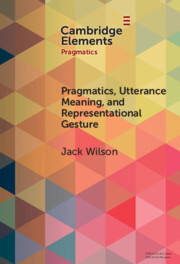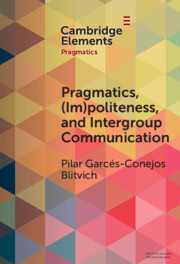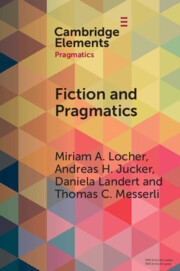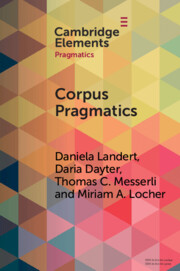About this Cambridge Elements series
The Cambridge Elements in Pragmatics series showcases dynamic and high-quality original, concise and accessible scholarly works. Written for a broad pragmatics readership it encourages dialogue across different perspectives on language use.
It is a forum for cutting-edge work in pragmatics: consolidating theory (especially through cross-fertilization), leading the development of new methods, and advancing innovative topics in pragmatics.
Elements in this series
-
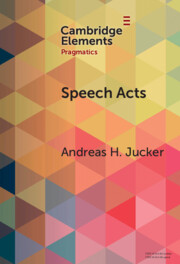
- Element
Speech Acts
-
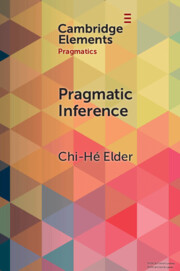
- Element
Pragmatic Inference
-
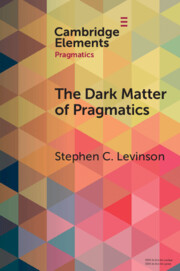
- Element
The Dark Matter of Pragmatics
-
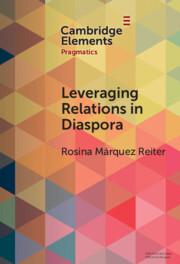
- Element
Leveraging Relations in Diaspora
About the Editors
Jonathan Culpeper is Professor of English Language and Linguistics in the Department of Linguistics and English Language at Lancaster University, UK. Spanning pragmatics, stylistics and the history of English, his major publications include Language and Characterisation in Plays and Other Texts (2001, Longman), Early Modern English Dialogues: Spoken Interaction as Writing (2010, CUP; co-authored with Merja Kytö), Impoliteness: Using Language to Cause Offence (2011, CUP), Pragmatics and the English Language (2014, Palgrave; with Michael Haugh), and English Language: Description, Variation and Context (2nd edn., 2018, Palgrave; lead editor). He was awarded a prestigious three-year ESRC UK Fellowship (2006-9) to study linguistic impoliteness, and for five years was co-editor-in-chief of the Journal of Pragmatics (2009-14). He is currently leading the £1 million AHRC-funded Encyclopedia of Shakespeare's Language project, which will provide evidence-based and contextualized accounts of Shakespeare’s language.
Michael Haugh is Professor of Linguistics in the School of Languages and Cultures at the University of Queensland, Australia. Spanning pragmatics, intercultural communication and humour studies, his major publications include Understanding Politeness (2013, CUP; co-authored with Dániel Kádár), Pragmatics and the English Language (2014, Palgrave; with Jonathan Culpeper), and Im/politeness Implicatures (2015, Mouton). He is a leading proponent of the Australian National Corpus and the recent establishment of the Language Technology and Data Analytics Lab (LADAL) at the University of Queensland. He is currently co-editor-in-chief of the Journal of Pragmatics (2015~), and has substantial editorial experience, including most recently, Doing Pragmatics Interculturally: Cognitive, Philosophical and Sociopragmatic Perspectives (2017, Mouton; with Rachel Giora), the Palgrave Handbook of Linguistic (Im)politeness (2017, Palgrave; with Jonathan Culpeper and Dániel Kádár), the Cambridge Handbook of Sociopragmatics (forthcoming, CUP; with Dániel Kádár and Marina Terkourafi), and Action Ascription (forthcoming, CUP; with Arnulf Deppermann).
Contact the Editors
If you would like more information about this series, or are interested in writing an Element, please contact one of the editors, Jonathan Culpeper (j.culpeper@lancaster.ac.uk) or Michael Haugh (michael.haugh@uq.edu.au).
About the Editorial Board
- Anne Barron (Leuphana University of Lüneburg, Germany)
- Betty Birner (Northern Illinois University, USA)
- Lucien Brown (Monash University, Australia)
- Billy Clark (Northumbria University, UK)
- Chris Cummins (University of Edinburgh, UK)
- Pilar Garcés-Conejos Blitvich (University of North Carolina at Charlotte, USA)
- Andreas Jucker (University of Zurich, Switzerland)
- Zohar Kampf (Hebrew University of Jerusalem, Israel)
- Miriam A. Locher (Universität Basel)
- Yoshiko Matsumoto (Stanford University, USA)
- Marina Terkourafi (Leiden University, The Netherlands)
- Chaoqun Xie (Zhejiang International Studies University)
Scope of the Pragmatics Elements Series
Theoretical Consolidations
Bringing together theorization on topic areas to enable cross-fertilization of approaches, it may include:
- Implicature and inference
- Presupposition
- Speech acts;
- Metapragmatics
- Pragmatics and the CA interface and
- Pragmatics and the sociological interface
Data and methods
Combining the new and distinct set of methods within which an area of application or subfield is associated including:
- On-line data and pragmatics
- Statistics, visualisations and pragmatics
- Multimodal pragmatics
- Literature, fiction and pragmatics;
- Experimental pragmatics
- Corpus pragmatics
Innovations
The latest developments within an area, including emerging and cutting-edge areas that push the boundaries of theory and method within pragmatics such as:
- Big data pragmatics
- Pragmatics of endangered languages
- Forensic pragmatics
- Pragmatics and health
- Multilingual pragmatics;
- Neuropragmatics
- Pragmatics of peace and conflict resolution
- Pragmatics of sign language
- Translational pragmatics
Each Element, written by a scholar in the field, aims to include:
- Clarity and accessibility for a broad readership
- The use of data - even if only short examples - to illustrate and tease out issues;
- Key theories, concepts and issues
- Data and/or methods
- Implications for pragmatics research
- Exploration of new avenues for pragmatics research;
- Consideration of key readings



